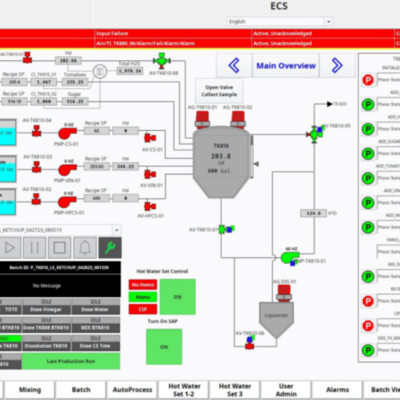News

Benefits of a Campaign Manager
Batch processing facilitates the repetitive, tightly controlled manufacture of many things. This type of operation is ideal for large scale manufacturing where products are assembled and modified in a series of stages or steps. When connected to a batch management software system, the number of ingredients, execution stages, and degree of processing complexity which can be handled by relatively unsophisticated operators can be extraordinary. The typical end results for manufacturers are lower cost per unit products with tight quality control and meticulous records of production.
Enterprise resource and scheduling systems are ubiquitous to modern manufacturing organizations. These are frequently mated to plant floor automation systems. For simple batch operations with savvy operators this task can be straightforward, particularly when aided by a batch management solution. However, in operations that require rapid processing or changeover between many in-progress batch orders, this can be challenging. The same is true if batch processing requirements for a single order are large in either complexity or an amount of time that spans beyond the purview of a single operator or team. Integration between the master resource and scheduling system and the batch operating environment can be enhanced using a campaign manager.
Read More | Posted In: Bakery Industry, Beverage Industry, Blogs, Chemical Industry, Consumer Goods, Distilleries, FactoryTalk Batch, Food Industry, Inductive Automation, Life Science Industry, Metals, Metals Industry, News

12 Batch Implementation Design Considerations
Batch systems are used for maximizing quality control, minimizing cost, and reducing loss by manufacturing smaller batches compared to a mass production model, which is why companies in the food and beverage, pharmaceutical, and chemical industries rely on them. The audience of a batch system is varied, and therefore the proper implementation of a batch system needs to consider many factors. From the Plant Manager, Operations, Engineering, and Maintenance to the Operators, all these personas have unique needs that must be considered.
The best practices dictated by standards such as ISA 88 and ISA 95 provide a great guideline or starting point, but these standards do not prescribe how to implement the details of a solution. Therefore, the following is intended to highlight some of the considerations for a system design.

Creating a Robust Equipment Model for Optimal Plant Performance
A plant’s capabilities of what and how products can be manufactured there reside in the capabilities of its equipment, materials, and personnel. These capabilities are captured by the Equipment Model as defined in ISA 88 & 95. Once you capture these capabilities, they are exposed to the recipe author to define how to execute the product manufacturing workflow, which is detailed in the ISA 88 Procedural Model.
Having a well-defined Equipment Model is paramount to enabling the plant’s maximum capabilities while providing the recipe author and operators with an intuitive experience. The Equipment capabilities definition should include the activities that the automation controls system can perform (i.e., Add Water) as well as the activities performed by the operators and other personnel (i.e., Manual Additions, Lab Sample Data, etc.).

Read More | Posted In: Bakery Industry, Beverage Industry, Blogs, Chemical Industry, Consumer Goods, Distilleries, Inductive Automation, Life Science Industry, Metals Industry

A Trusted Advisor Cements Their Value During Project Startups
Engineering projects may take extended periods of time to develop and physically install, often with macro progress being tough to gauge on a day-to-day basis. These efforts come to a head with a flurry of activity in the final hours before “go live”. Tradesmen flutter about making final adjustments to installed bulk hardware and intricate instruments, electricians frantically make and test terminations, and supervising engineers and integrators follow about ensuring that checklist items are noted and addressed. These activities can resemble an orchestral presentation that might span multiple shifts for days and weeks on end. It is at this time that the systems integrator proves their value and clients learn that having a true trusted advisor is critically important to success.
There was a time where simple catch all language could be inserted into automation project contracts and a client could fairly expect an integrator to ensure that a system was complete. Language like “systems integrator must include all miscellaneous items required to make a complete system” would be included in specifications. This verbiage would cover small things like signal conditioning hardware and loop tuning labor and/or tools and it was reasonable to expect that the integrator could include “everything”. The definition of complete has changed considerably over the last decade. Factories today are far more complex, and the plant automation systems are interwoven into every part of many organizations. Protection language like those mentioned before would be wholly inadequate in covering the breadth of items that intermingle with the controls today. Furthermore, attempts to bind project contracts with far-reaching, boilerplate language would leave enormous gaps in functionality that would render most systems a shell of what is truly possible with modern technology.
Read More | Posted In: Bakery Industry, Beverage Industry, Chemical Industry, Consumer Goods, Distilleries, Food Industry, Life Science Industry, Metals Industry, News

ECS Delivers True Long Term Success as Trusted Advisors
People and organizations leverage trusted advisors in all facets of life. Whether it is something as commercial as an auto mechanic or as intimate as a primary care physician, attorney, or wealth advisor, trusted advisors play a role just about everywhere. They maintain deep, current knowledge in specialized fields, and they stand ready to support those in need. They are driven by excellence, thinking beyond themselves or their own organization and focus on the broader environment. Where their focus intersects with the needs of a client, a true trusted advisor relationship can take hold.
Control systems integration is young but maturing when compared to many other functions in legacy buildings and operations. The discipline, which barely existed a generation and a half ago, has become the technological focal point of modern manufacturing. There are no lulls or definable steps as technology continually advances at a dizzying pace. What started as ways to simplify wiring and logic applied to flexibility in controls has evolved into a holistic environment which links manufacturing, operations, and supply chains via a web of connected people and equipment. Manufacturers leverage related professionals each day to stay at the edge of technology and to apply it effectively.
ECS Solutions (ECS) has been around since the dawn of the systems integrator-for-hire concept. Our success has been driven by working collaboratively with our clients as true strategic partners. We know that enduring bonds do not develop by accident nor out of contractual obligation. Our clients expect that we know not only where technology is today, but also where it is going. They leverage our extensive knowledge and experience in ways that address both their immediate needs and their continuing objectives.
Read More | Posted In: Bakery Industry, Beverage Industry, Blogs, Chemical Industry, Consumer Goods, Distilleries, Food Industry, Life Science Industry, Metals Industry, News

KNOW YOUR LOOP BEFORE YOU ATTEMPT TO TUNE YOUR LOOP – PART 2
In the last article for this topic, we discussed the importance of field data collection and the importance of a methodical approach to PID tuning. I introduced the concept of the bump test and that its results would help guide the steps and equations used in proper tuning. Here I will explore that concept in greater detail. At ECS we use a visual tool for data collection in every instance. The tool may be part of a controller suite, or it may be stand-alone but, in any case, it is imperative to capture accurate information about the performance of your system before planning and then programming a solution.
In the interest of time, this article will focus on tuning concepts for self-regulating loops as they make up the majority of applications in the industrial field. A common example of this type of loop is a flow control which varies flow through a pipe via either variable speed control on a pump or a position-controlled valve. In this example, the flow can be adjusted by speed adjustment of the pump or position of a valve and the result of the change ordered from the controller is stable and is generally fast and repeatable.
Read More | Posted In: Beverage Industry, Blogs, Chemical Industry, Consumer Goods, Food Industry, Life Science Industry

Innovative Tools for the Evolving Systems Integrator
The personnel challenges facing virtually every industry over the last few years have been nothing short of astonishing. Proper candidates have become increasingly difficult to court and bring on board. New staff in key roles are tasked to accomplish more with fewer floor operators and technology is increasingly leveraged to close the resulting gaps. This is not unique in history although it may seem that way due to the current media deluge surrounding business intelligence and general-purpose visibility software that makes life easier, smarter, and generally more efficient.
Industrial software is again playing a leading role in the current intelligence revolution. Inductive Automation didn’t invent floor supervisory (SCADA) software, nor did they invent the first responsive, general-purpose web software. However, their current offerings certainly do marry these concepts together in a way that hasn’t existed in industry before. Since 2010 their award-winning Vision Module has enhanced the experiences of factory floor users everywhere, easily connecting complex factory controllers to databases, alarm and reporting systems, and intuitive visualization tools. This product is robust, proven, and works very well for users “inside the industrial network” of many facilities. Today this is coupled with the newer Perspective Module which is an equally powerful tool for use in mobile-responsive applications. For situations where a user may be “outside the industrial network” or simply need to utilize a variety of hardware platforms like PCs, phones, or tablets, Perspective provides an ideal solution.
Read More | Posted In: Bakery Industry, Beverage Industry, Blogs, Chemical Industry, Consumer Goods, Food Industry, Inductive Automation, Life Science Industry, Metals Industry, SCADA

ECS & Ignition Deliver for AmeriQual
Success in many industries is the product of preparation and opportunity. Agility is frequently the lubricant that enables businesses to adapt and win a project or contract. This is especially true in private-label food manufacturing. “The people, processes, and equipment must be able to adapt to ever-changing market demands,” says Wes Blankenberger, Vice President of Operations & Maintenance for AmeriQual Group, LLC, in Evansville, IN (AmeriQual). Brand owners must beat their competition to market and the best way to do that is frequently via a capable private labeling partner. Much like brand owners leverage private label manufacturers, the manufacturing plants themselves leverage partners to assemble existing and new equipment into functional processing systems, often on aggressive timelines.
Similar traits and situations define success inside of the control system integration space. Much like private label manufacturing, clients call upon these firms because of their known ability to deliver in specialized market segments. They’re well-trained and typically gainfully employed by clients where they excel. Rarely are they entirely idle but their mix of professionals at different levels and specialties allows them to apply staff, often on short notice, to applications. Their highly trained teams can tackle projects or parts of projects large and small, often in concert with their teammates or outside firms.
Read More | Posted In: Case Studies, Chemical Industry, Uncategorized

High Performance Rubber Batching by ECS
ECS Solutions, Inc (ECS) recently used its extensive batch experience and dynamic company structure to help a major Southeast US rubber manufacturer realize and achieve project success. The end client had an existing semi-automated batch and mixing operation and had recently commissioned a project to duplicate this line’s operation with a new mix room, ingredient systems, and rubber mixer. They employed a powerhouse electrical contractor to connect all the new equipment and make it operate as a single system and this was largely successful. However, as the project moved through its lifecycle, the team realized that sophisticated batch operations would require specialized talents that were missing from the initial project team.
A quick web search for batch expertise within the region quickly pointed to ECS. It’s rare that ECS assets are idle, waiting for project work to arrive, and that was true in this case. Fortunately, the electrical contractor was a proven operator who had the situation in check with respect to major control equipment, general electrical planning, and installation, so ECS was able to apply only batch-specific resources and a slim project management umbrella. The ECS team quickly mobilized and took control of the batch portion of the project.
Read More | Posted In: Case Studies, Chemical Industry

PlantPAx Objects for Chemical Processor
ECS Solutions, Inc. (ECS) recently executed an increasingly rare upgrade for a midwestern chemical processor. The application was rare in that the facility and its controls were neither a brand new, greenfield design nor an upgrade from existing, controller-based automation. This grain processor utilizes volatile hexane in their oil extraction operations so the facility has classified locations throughout. Thus, the legacy control system leveraged pneumatic integration, and hard-wired, and hard-plumbed control loops. That system served them admirably for years and was left in place until this was replaced with a modern electrical system at the direction of ECS.
To facilitate a clean project that could be adopted easily by seasoned operators, ECS built the automation using Rockwell Automation ControlLogix hardware and PlantPAx objects for the code. The robust library of process objects made the code generation very straightforward, and the controller code coupled seamlessly to the Rockwell FactoryTalk View SE SCADA. ECS’ high-performance HMI design focused on a simple, flatter overall concept that leveraged color and animation effectively to drive efficient user interaction. Information from code easily passes to the newly deployed FT Historian system, sharing the same information to the long-term storage.
Read More | Posted In: Case Studies, Chemical Industry

Ignition Perspective® Module
Human-machine interface (HMI) vendors have been promising a utopia based around web-based technologies for over two decades. The prospect of simply providing a web address to anyone within an organization that leads to a fast-loading, full-power supervisory control and data acquisition (SCADA) system has been on most factories’ wish list for a long time. After all, internet page tools and functionality have far outpaced advancements in SCADA software over the same time. The advancements seem to leap forward every time someone reloads a page, with new widgets and tools available almost daily. When coupled with hardware developments like high contrast screens; enhanced touchscreen operations; and capabilities like Bluetooth, accelerometers, geolocation, and more; a flexible, web-based option has been coveted.
What many casual users fail to understand about HMI solutions is exactly how tightly the software is connected to the factory floor controllers. This connection via high-security networks, VPNs, and masks, can be tricky to navigate, particularly when the architecture is intentionally complex to provide security for the systems. Further, most people don’t realize the architectural complexity of software that link to sometimes multiple databases and remote data sources, where gigabits of proprietary information streams into and out of the SCADA application. It has been the responsibility of the integrators of these solutions to protect would-be users from themselves in a lot of applications. Poorly developed programs could create vulnerabilities to the operation of equipment, expose floor workers to potential risk, and possibly allow trade secrets to escape into cyberspace.
Read More | Posted In: Bakery Industry, Beverage Industry, Blogs, Chemical Industry, Distilleries, Food Industry, Inductive Automation, Metals Industry, SCADA

